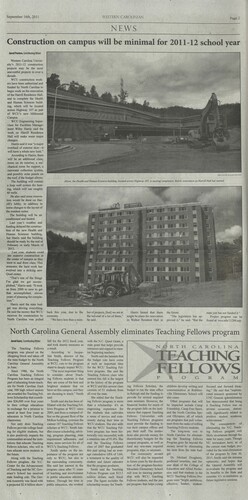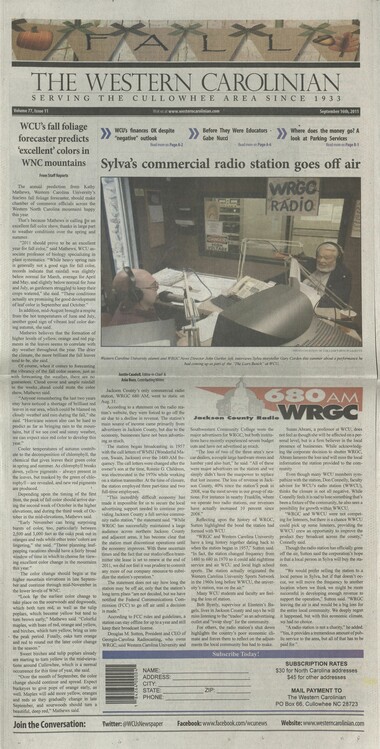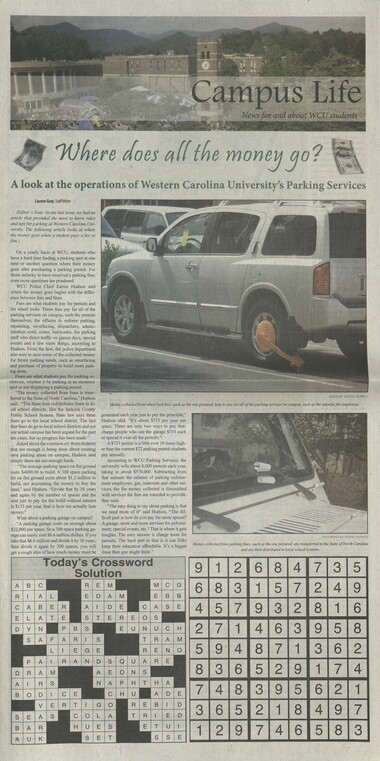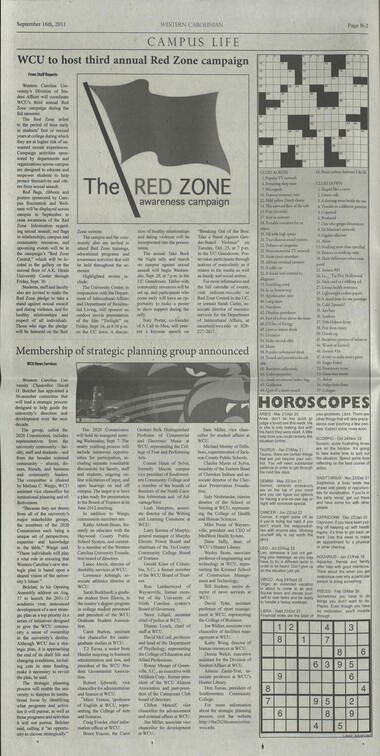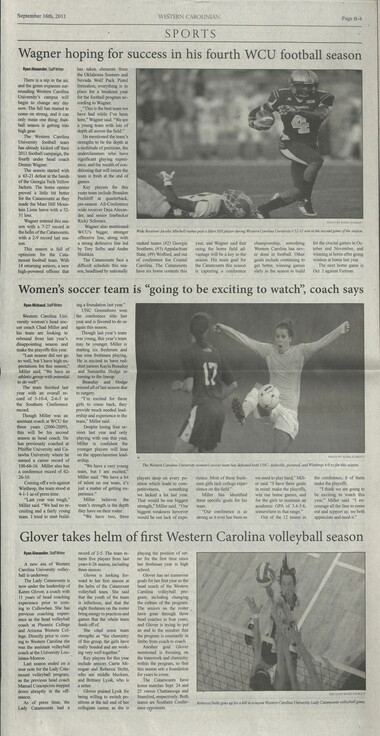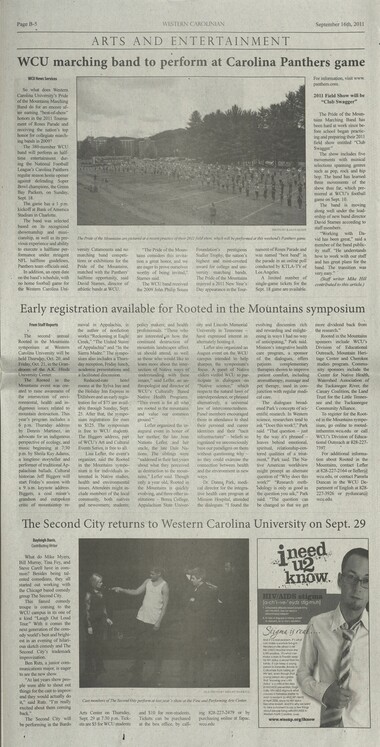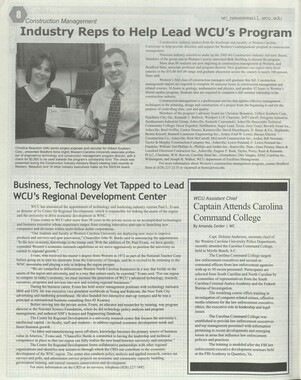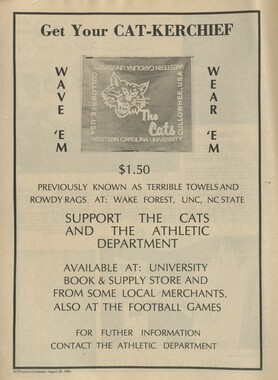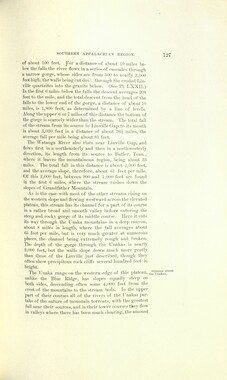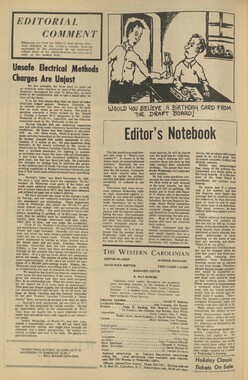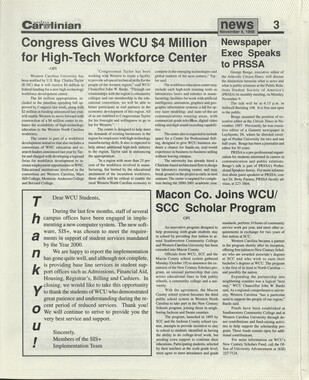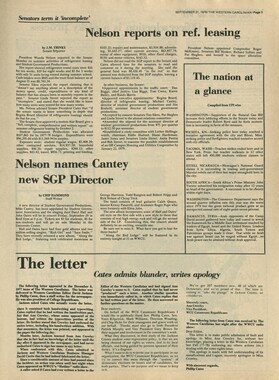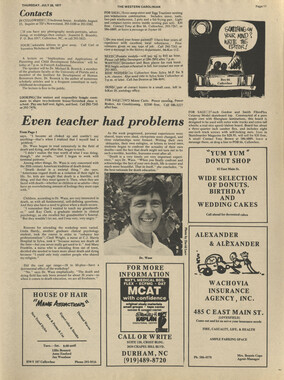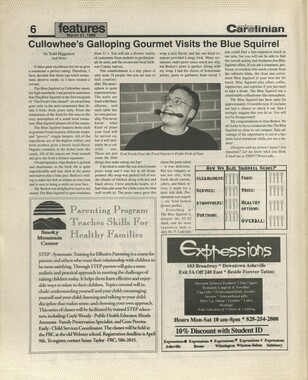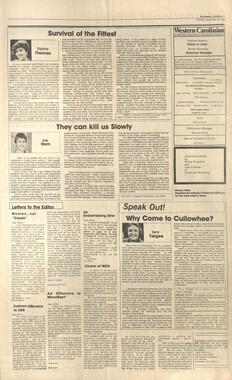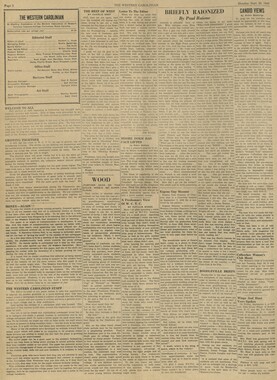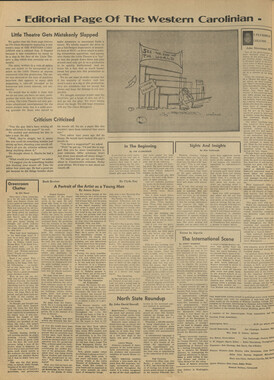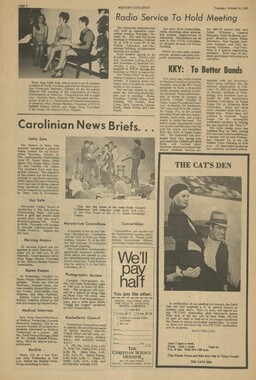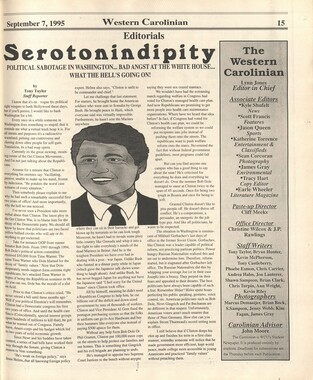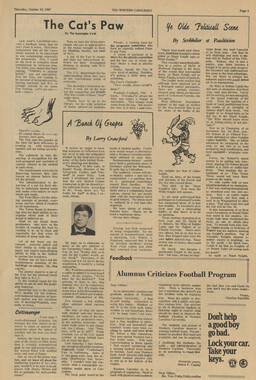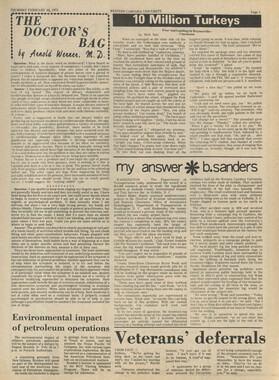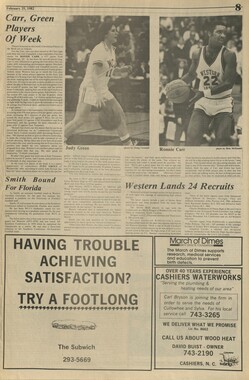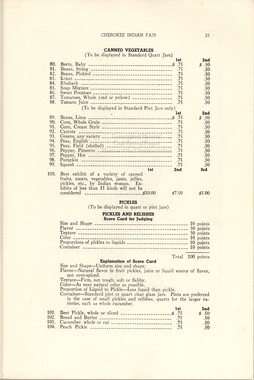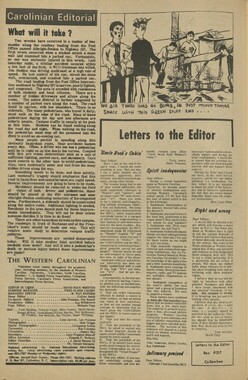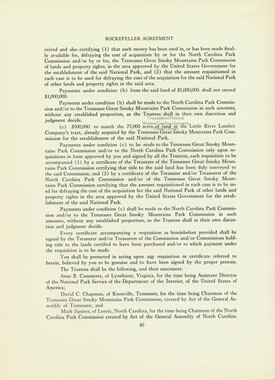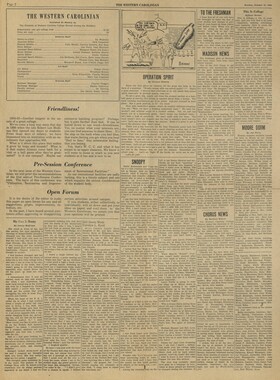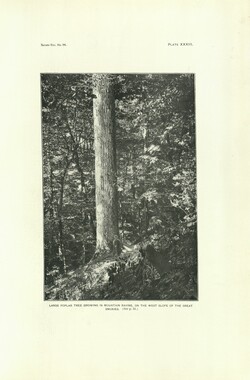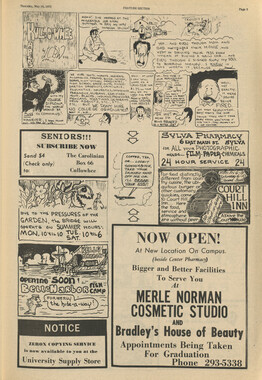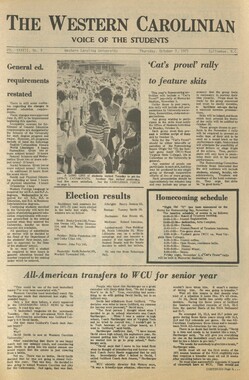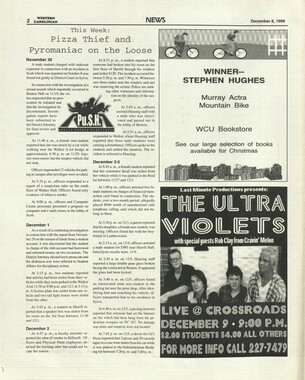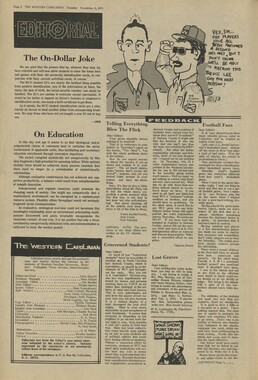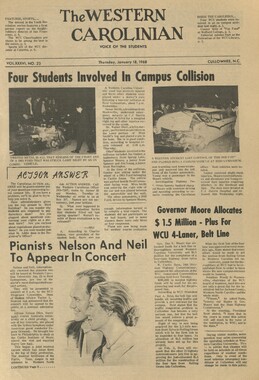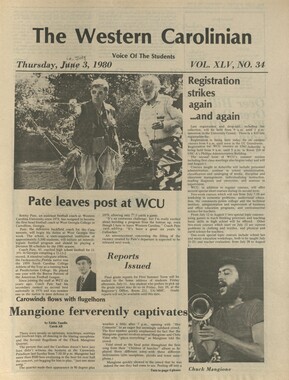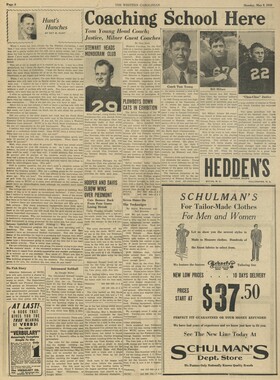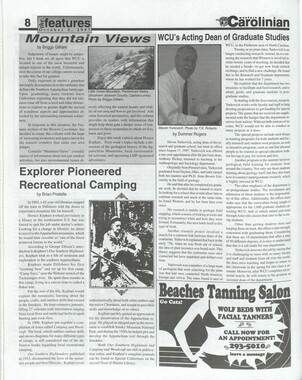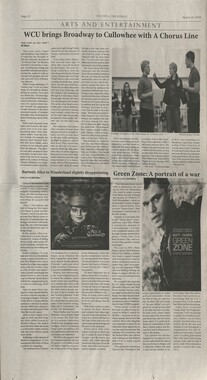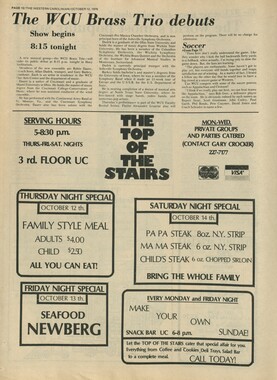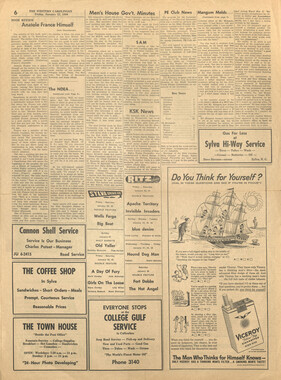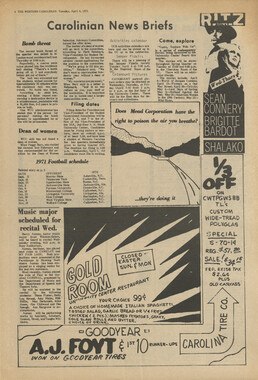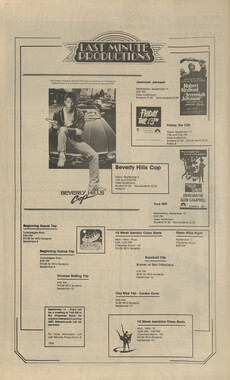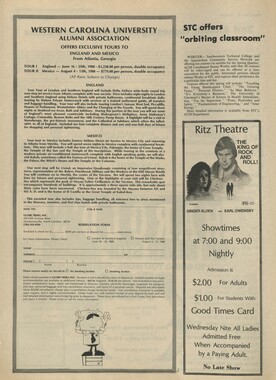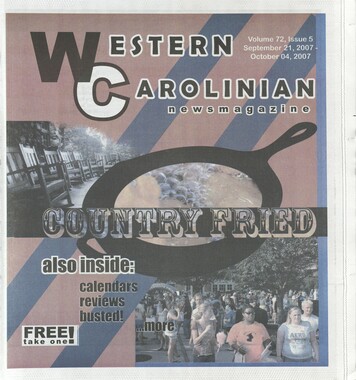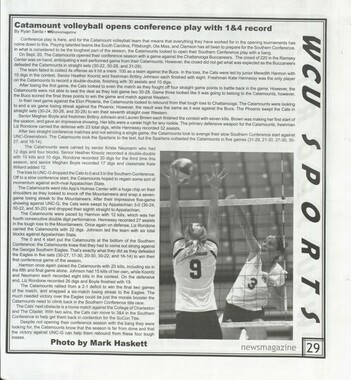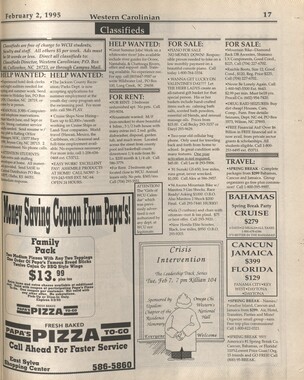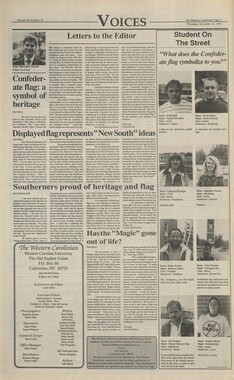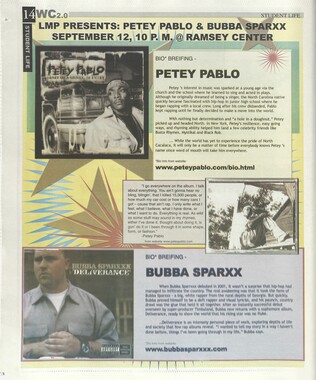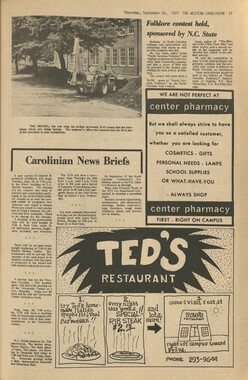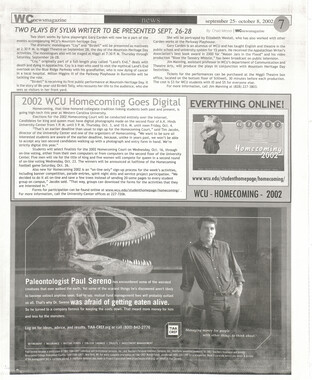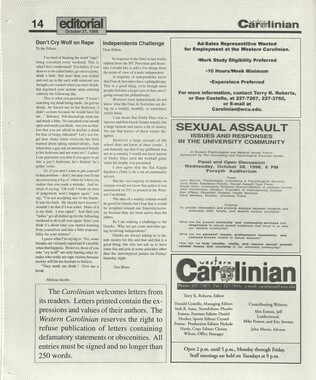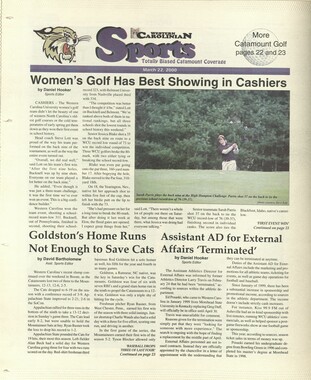Western Carolina University (21)
View all
- Canton Champion Fibre Company (2308)
- Cherokee Traditions (291)
- Civil War in Southern Appalachia (165)
- Craft Revival (1942)
- George Masa Collection (137)
- Great Smoky Mountains - A Park for America (2900)
- Highlights from Western Carolina University (422)
- Horace Kephart (973)
- Journeys Through Jackson (159)
- LGBTQIA+ Archive of Jackson County (85)
- Oral Histories of Western North Carolina (316)
- Picturing Appalachia (6797)
- Stories of Mountain Folk (413)
- Travel Western North Carolina (153)
- Western Carolina University Fine Art Museum Vitreograph Collection (129)
- Western Carolina University Herbarium (92)
- Western Carolina University: Making Memories (738)
- Western Carolina University Publications (2491)
- Western Carolina University Restricted Electronic Theses and Dissertations (146)
- Western North Carolina Regional Maps (71)
- World War II in Southern Appalachia (131)
University of North Carolina Asheville (6)
View all
- Allanstand Cottage Industries (62)
- Appalachian National Park Association (53)
- Bennett, Kelly, 1890-1974 (1463)
- Berry, Walter (76)
- Brasstown Carvers (40)
- Carver, George Washington, 1864?-1943 (26)
- Cathey, Joseph, 1803-1874 (1)
- Champion Fibre Company (233)
- Champion Paper and Fibre Company (297)
- Cherokee Indian Fair Association (16)
- Cherokee Language Program (22)
- Crowe, Amanda (40)
- Edmonston, Thomas Benton, 1842-1907 (7)
- Ensley, A. L. (Abraham Lincoln), 1865-1948 (275)
- Fromer, Irving Rhodes, 1913-1994 (70)
- George Butz (BFS 1907) (46)
- Goodrich, Frances Louisa (120)
- Grant, George Alexander, 1891-1964 (96)
- Heard, Marian Gladys (60)
- Kephart, Calvin, 1883-1969 (15)
- Kephart, Horace, 1862-1931 (313)
- Kephart, Laura, 1862-1954 (67)
- Laney, Gideon Thomas, 1889-1976 (439)
- Masa, George, 1881-1933 (61)
- McElhinney, William Julian, 1896-1953 (44)
- Niggli, Josephina, 1910-1983 (10)
- North Carolina Park Commission (105)
- Osborne, Kezia Stradley (9)
- Owens, Samuel Robert, 1918-1995 (11)
- Penland Weavers and Potters (36)
- Roberts, Vivienne (15)
- Roth, Albert, 1890-1974 (142)
- Schenck, Carl Alwin, 1868-1955 (1)
- Sherrill's Photography Studio (2565)
- Southern Highland Handicraft Guild (127)
- Southern Highlanders, Inc. (71)
- Stalcup, Jesse Bryson (46)
- Stearns, I. K. (213)
- Thompson, James Edward, 1880-1976 (226)
- United States. Indian Arts and Crafts Board (130)
- USFS (683)
- Vance, Zebulon Baird, 1830-1894 (1)
- Weaver, Zebulon, 1872-1948 (58)
- Western Carolina College (230)
- Western Carolina Teachers College (282)
- Western Carolina University (2008)
- Western Carolina University. Mountain Heritage Center (18)
- Whitman, Walt, 1819-1892 (10)
- Wilburn, Hiram Coleman, 1880-1967 (73)
- Williams, Isadora (3)
- Cain, Doreyl Ammons (0)
- Crittenden, Lorraine (0)
- Rhodes, Judy (0)
- Smith, Edward Clark (0)
- Appalachian Region, Southern (2940)
- Asheville (N.C.) (1944)
- Avery County (N.C.) (26)
- Blount County (Tenn.) (195)
- Buncombe County (N.C.) (1680)
- Cherokee County (N.C.) (283)
- Clay County (N.C.) (556)
- Graham County (N.C.) (238)
- Great Smoky Mountains National Park (N.C. and Tenn.) (525)
- Haywood County (N.C.) (3573)
- Henderson County (N.C.) (70)
- Jackson County (N.C.) (4919)
- Knox County (Tenn.) (35)
- Knoxville (Tenn.) (13)
- Lake Santeetlah (N.C.) (10)
- Macon County (N.C.) (421)
- Madison County (N.C.) (216)
- McDowell County (N.C.) (39)
- Mitchell County (N.C.) (135)
- Polk County (N.C.) (35)
- Qualla Boundary (982)
- Rutherford County (N.C.) (78)
- Swain County (N.C.) (2185)
- Transylvania County (N.C.) (270)
- Watauga County (N.C.) (12)
- Waynesville (N.C.) (86)
- Yancey County (N.C.) (72)
- Aerial Photographs (3)
- Aerial Views (60)
- Albums (books) (4)
- Articles (1)
- Artifacts (object Genre) (228)
- Bibliographies (1)
- Biography (general Genre) (2)
- Cards (information Artifacts) (38)
- Clippings (information Artifacts) (192)
- Copybooks (instructional Materials) (3)
- Crafts (art Genres) (622)
- Depictions (visual Works) (21)
- Design Drawings (1)
- Digital Moving Image Formats (2)
- Drawings (visual Works) (185)
- Envelopes (101)
- Exhibitions (events) (1)
- Facsimiles (reproductions) (1)
- Fiction (general Genre) (4)
- Financial Records (12)
- Fliers (printed Matter) (67)
- Glass Plate Negatives (381)
- Guidebooks (2)
- Internegatives (10)
- Interviews (817)
- Land Surveys (102)
- Letters (correspondence) (1045)
- Manuscripts (documents) (618)
- Maps (documents) (177)
- Memorandums (25)
- Minutes (administrative Records) (59)
- Negatives (photographs) (6090)
- Newsletters (1290)
- Newspapers (2)
- Notebooks (8)
- Occupation Currency (1)
- Paintings (visual Works) (1)
- Pen And Ink Drawings (1)
- Periodicals (193)
- Personal Narratives (10)
- Photographs (12976)
- Plans (maps) (1)
- Poetry (6)
- Portraits (4568)
- Postcards (329)
- Programs (documents) (181)
- Publications (documents) (2444)
- Questionnaires (65)
- Relief Prints (26)
- Sayings (literary Genre) (1)
- Scrapbooks (282)
- Sheet Music (2)
- Slides (photographs) (402)
- Songs (musical Compositions) (2)
- Sound Recordings (796)
- Specimens (92)
- Speeches (documents) (18)
- Tintypes (photographs) (8)
- Transcripts (324)
- Text Messages (0)
- A.L. Ensley Collection (275)
- Appalachian Industrial School Records (7)
- Appalachian National Park Association Records (336)
- Axley-Meroney Collection (2)
- Bayard Wootten Photograph Collection (20)
- Bethel Rural Community Organization Collection (7)
- Blumer Collection (5)
- C.W. Slagle Collection (20)
- Canton Area Historical Museum (2110)
- Carlos C. Campbell Collection (462)
- Cataloochee History Project (64)
- Cherokee Studies Collection (4)
- Daisy Dame Photograph Album (5)
- Daniel Boone VI Collection (1)
- Doris Ulmann Photograph Collection (112)
- Elizabeth H. Lasley Collection (1)
- Elizabeth Woolworth Szold Fleharty Collection (4)
- Frank Fry Collection (95)
- George Masa Collection (173)
- Gideon Laney Collection (452)
- Hazel Scarborough Collection (2)
- Hiram C. Wilburn Papers (28)
- Historic Photographs Collection (236)
- Horace Kephart Collection (861)
- Humbard Collection (33)
- Hunter and Weaver Families Collection (1)
- I. D. Blumenthal Collection (4)
- Isadora Williams Collection (4)
- Jesse Bryson Stalcup Collection (47)
- Jim Thompson Collection (224)
- John B. Battle Collection (7)
- John C. Campbell Folk School Records (80)
- John Parris Collection (6)
- Judaculla Rock project (2)
- Kelly Bennett Collection (1482)
- Love Family Papers (11)
- Major Wiley Parris Civil War Letters (3)
- Map Collection (12)
- McFee-Misemer Civil War Letters (34)
- Mountain Heritage Center Collection (4)
- Norburn - Robertson - Thomson Families Collection (44)
- Pauline Hood Collection (7)
- Pre-Guild Collection (2)
- Qualla Arts and Crafts Mutual Collection (12)
- R.A. Romanes Collection (681)
- Rosser H. Taylor Collection (1)
- Samuel Robert Owens Collection (94)
- Sara Madison Collection (144)
- Sherrill Studio Photo Collection (2558)
- Smoky Mountains Hiking Club Collection (616)
- Stories of Mountain Folk - Radio Programs (374)
- The Reporter, Western Carolina University (510)
- Venoy and Elizabeth Reed Collection (16)
- WCU Gender and Sexuality Oral History Project (32)
- WCU Mountain Heritage Center Oral Histories (25)
- WCU Oral History Collection - Mountain People, Mountain Lives (71)
- WCU Students Newspapers Collection (1923)
- Western North Carolina Tomorrow Black Oral History Project (69)
- William Williams Stringfield Collection (2)
- Zebulon Weaver Collection (109)
- African Americans (390)
- Appalachian Trail (35)
- Artisans (521)
- Cherokee art (84)
- Cherokee artists -- North Carolina (10)
- Cherokee language (21)
- Cherokee pottery (101)
- Cherokee women (208)
- Church buildings (190)
- Civilian Conservation Corps (U.S.) (111)
- College student newspapers and periodicals (2012)
- Dams (108)
- Dance (1023)
- Education (222)
- Floods (63)
- Folk music (1015)
- Forced removal, 1813-1903 (2)
- Forest conservation (220)
- Forests and forestry (1197)
- Gender nonconformity (4)
- Great Smoky Mountains National Park (N.C. and Tenn.) (181)
- Hunting (46)
- Landscape photography (25)
- Logging (119)
- Maps (83)
- Mines and mineral resources (9)
- North Carolina -- Maps (18)
- Paper industry (38)
- Postcards (255)
- Pottery (135)
- Railroad trains (72)
- Rural electrification -- North Carolina, Western (3)
- School integration -- Southern States (2)
- Segregation -- North Carolina, Western (5)
- Slavery (5)
- Sports (452)
- Storytelling (243)
- Waterfalls -- Great Smoky Mountains (N.C. and Tenn.) (66)
- Weaving -- Appalachian Region, Southern (280)
- Wood-carving -- Appalachian Region, Southern (328)
- World War, 1939-1945 (173)
Western Carolinian Volume 77 Number 11
Item
Item’s are ‘child’ level descriptions to ‘parent’ objects, (e.g. one page of a whole book).
-
-
September 16th, 2011 WESTERN CAROLINIAN Page 2 NEWS Construction on campus will be minimal for 2011-12 school year Jared Ponton, Contributing Writer Western Carolina Univer- sitys 2011-12 construction projects may be the most uneventful projects in over a ' decade. WCU construction work- ers have been authorized and funded by North Carolina to begin work on the renovation of the Harrill Residence Hall, and to complete the Health and Human Sciences build- ing, which will be located across Highway 107 as part of WCUs new Millennial Campus. WCU Engineering Super- visor for Facilities Manage- ment Wiley Harris said the work on Harrill Residence Hall will make some major changes. Harris said it was a major overhaul of exterior skinit will have a whole new look. According to Harris, there will be an additional class; room on its exterior, a me- chanical room for support, a . rainwater collection system, and possibly solar panels on the roof, if the budget allows. The building will contain a loop well system for heat- ing, which will use roughly 40 wells. : He also said some renova- tion would be done on Har- rills lobby, in addition to some changes to the layout of the resident suites. _ The building will be air ~ conditioned and heated. Last years weather and funding delayed the construc- tion of the new Health and Human. Sciences building, but Harris said the building should be ready by the end of February or early March a 2012, see massive construction at the center of campus as they went to and from class. This _ semester, the hard work has _ evolved into a sone new Quad center. Thats one of the things. Im glad we. got accom- plished, Harris said. It took us from 2000 to now to get that accomplished, eleven years of planning for comple- tion. get was driving everything. _Last year, students could Harris said the state bud- Above, the Health and Human Sciences building, located across Highway 107, is nearing completion. Below, renovation on Harrill Hall has started. He said the money that WCU back this year, due to the receives for construction by North Carolina was pulled economy. We have less than a num- ber of projects, [but] we are at the tail-end of a lot of them, he said. Harris hinted that there might be plans for renovation in Walker Resident Hall in the fcture. Ene legislation has ap- proved it, he said. But the state just has not funded it. ; Project progress can be ~ found at: weu.edu/11284.asp. North Carolina General Assembly eliminates Teaching Fellows program Jared Gant, ee Writer The Teaching Fellows program was placed on the chopping block and taken off the state. budget by the North Carolina General Assembly in June. Since 1986, the North Carolina Teaching Fellows Program has been an integral part of educating future teach- ers for North Carolina. Each year, 500 high school seniors are awarded the Teaching Fel- lows Scholarship that contrib- utes $26,000 over four years to their college educations in exchange for a promise to spend at least four years as educators in North Carolina classrooms. : Not only does Teaching Fellows provide college fund- ing for eligible students, but it also positively impacts the communities around the insti- tutions that educate Teaching Fellows scholars, who will in - turn educate more students in the future. Along with the Teaching Fellows program, the N.C. Center for the Advancement of Teaching and the NC Gov- ernors School has received state funding cuts. The Gen- eral Assembly was faced with a projected $2.4 billion short- fall ae the 2012 fiscal year, and took drastic measures as a result. According to . Jacque- line Smith, director of the Teaching Fellows Program at WCU, cuts to the program stand to deeply impact WCU. The most important thing to consider...about Teach- ing Fellows students is that they are some of the best and brightest students that we have on this campus, and they are choosing to teach, Smith said. Smith said she has been af- filiated with the Teaching Fel- lows Program at WCU since 2005, and from a cramped of- fice on the ground floor of the McKee building, oversees the current 187 Teaching Fellows scholars at WCU. Smith han- dles course scheduling, advis- ing, program planning, state requirement adherence, and many more services for all of WCUs Teaching Fellows. Smith spoke on the .im- portance of the program not only to WCU, but also to the surrounding community. She said her interest in the program came after 11 years of teaching and involvement in public education adminis- tration. Through her time in public education, she worked with the N.C. Quest Grant, a state grant that helps provide resources and support to men- tor beginning teachers. Smith said she laments that the budget cuts have come at such an important time for the WCU Teaching Fel- lows program. She said the Teaching Fellows class who . entered this fall is the largest in the history of the program at WCU and this newest class consists of 52 students from all over the state. She added that the Teach- ing Fellows program is more than a scholarship- its an engrossing experience for the students that cultivates a sense of service and com- munity during their time as WCU students. She also adds that the WCU Teaching Fel- lows program has been his- torically very successful, with a retention rate of 93.4%. She said the Teaching Fellows class of 2007 that graduated this past spring had an aver- age cumulative GPA of 3.64, a testament to the quality of student and future educator that the program produces. Smith said the Teaching Fellows Program cost $13.5 million dollars each -fiscal year. The figure includes the scholarship money for Teach- NORTH CAROLINA ing Fellows Scholars, the budget to runthe state office in Raleigh and the funding to provide for several required state seminars. However, the financial burden for much of the program falls on the insti- tutions that support Teaching Fellows. Universities with Teaching Fellows programs must provide the funding to run their campus offices and - pay their staff. The institu- tions also provide money for discretionary budgets for the campus programs, as well as fund any non-state required programs, trips, or seminars. The community around WCU will also be impacted in future years by the dissolu- tion of, the program-Smokey Mountain Elementary School will lose its tutoring partner- ship with WCU. Teaching Fellows students, and the pen pal program that helps young children develop writing and communication at Robbins- ville Elementary School will also cease. - Other programs that will be impacted include Camp Friendship, Camp Free Spirit, and the North Carolina Spe- cial Olympics, all of which are programs that pull volun- teers from the ranks of willing Teaching Fellows students. The long-term cost to North Carolina for eliminat- ing the Teaching Fellows Program goes far beyond the money saved by eliminating the item from the state bud- eG Dr. Michael Dougherty, professor emeritus, and for- mer dean of the College of Education. and Allied Profes- sion said that students in the WCU Teaching Fellows Pro- gram were bright, ambitious, effective, leaders, student- focused and forward think- ing. He said that sophisti- . cated research sponsored by UNC General Administration has demonstrated that being a Teaching Fellow was on several occasions, _ statisti- cally significantly related to positive student academic achievement. The consequences of. eliminating the N.C. Teach- - ing Fellows program will likely reverberate through the state for many years. Though NC. lawmakers have, as of the current state budget, pro- vided for the total elimination of the program by June 30, 2015, Smith said she remains optimistic, and hopes that the General Assembly will re-evaluate the program and its benefits to the State and consider its re-institution in future legislative sessions. +
Object
Object’s are ‘parent’ level descriptions to ‘children’ items, (e.g. a book with pages).
-
The Western Carolinian is Western Carolina University's student-run newspaper. The paper was published as the Cullowhee Yodel from 1924 to 1931 before changing its name to The Western Carolinian in 1933.
-

